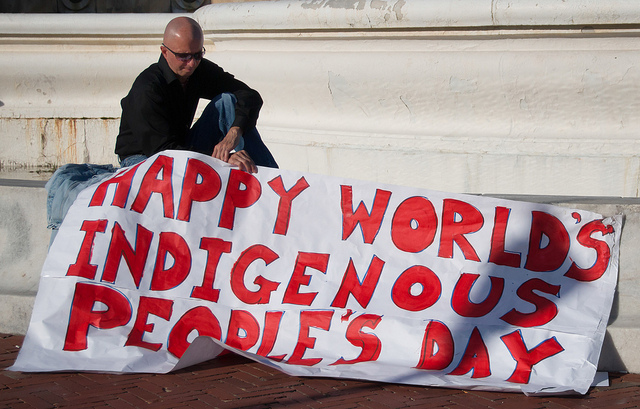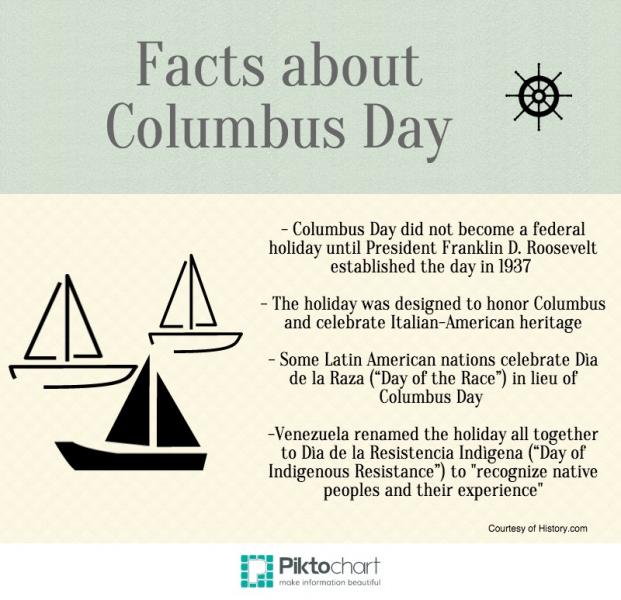Columbus Day Viewed In New Light

University of Southern California professor Peter Mancall of History and Anthropology says the switch from the Columbus “story of success” to one of “tragedy” began in the 1960s and 1970s, but really gained attention in 1992—the 500th anniversary of Christopher Columbus’ maiden voyage to the Americas.
“There is an older way of thinking of Europeans crossing the Atlantic and heroism… Now, some people think Columbus doesn’t fit in this modern world,” said Mancall.
Even the language used to discuss Columbus’ journey has changed.
Student Brianna Cheeks visited USC's campus on Monday afternoon and when asked to explain Columbus Day, Cheeks corrected herself when she initially stated Columbus founded America.
“Christopher Columbus came to America,” Cheeks stressed. “He didn’t find America in 1492.”
Nonetheless, some traces of Columbus and his ideologies continue to exist in today’s society.
The Columbusing of Culture
Laura Castañeda, Professor of Professional Practice at USC, says "Columbusing" aspects of another’s culture is commonplace, especially in popular culture. NPR defines Columbusing as the purported discovery of a “new” concept that already existed, simply “outside your own culture, nationality, race or even, say, your neighborhood.”
“We see lots of white artists, for example, suddenly discovering things that have been common in African-American culture whether it comes to music or dance or language,” said Castañeda. She continued, “I just don’t even think people notice it. They just think, ‘Wow, that’s cool. That’s kind of ethnic. It’s hip and fun,’ without realizing it's something other than just fashion.”
Castañeda looks at cultural appropriation in a similar vein.
“It steals from the people that originally created something. It’s taking away from what they’ve created and what they’ve done.”
SEE ALSO: Inspiration Runs Both Ways At UCLA's Ghanaian Fabric Exhibit
But according to Castañeda, the normalization of Columbusing is an indicator of larger societal issues.
“It’s just disrespectful in many ways to lots of different cultures. Many people are trying to bring more awareness to these issues. Some of these issues deserve to some thoughtful consideration.”
Mancall echoed Castañeda’s sentiments of unawareness and disrespect, specific to Native Americans.
“In a society in which [people] recognize the importance of indigenous people, we would not have the demeaning stereotypes that exist and move on from this ‘redskins’ debate,” said Mancall, referring to sports team names like the Washington Redskins, Atlanta Braves, and Cleveland Indians.
But the original form of Columbusing is more far-reaching.
“People think Columbus discovered America and it was already here. [The Americas] already had a rich and developed culture/cultures that ended up being destroyed because of disease and violence,” said Castañeda.

Pushing Back Against Columbus Day
Pamela Villasenor, the Director of Special Projects with Fernandeno Tataviam Band of Mission Indians in San Fernando, knows firsthand the results of negative representations of Native Americans.
As someone who works with children and families, Villasenor says some Native children have a “psychologically damaged feeling that they’re savages or stuck in the past” based on historical depictions of themselves they are exposed to.
“Society is better served when we are brave enough to correct misinformed traditions,” said Villasenor.
For her, changing the focus from honoring Columbus and shifting it to an Indigenous Peoples’ Day does more than just reframe the day to talk about indigenous people.
“Rebranding and renaming Columbus Day to celebrate indigenous people is a benefit to people who are indigenous people and those who are a part of the settler nation state. It is of the utmost importance to integrate historically accurate and culturally competent history and information in the American discourse,” said Villasenor.
Her only concern for an Indigenous Peoples' Day would be its potential opponents, as some communities hail Columbus as a hero.
In Seattle for example, the Associated Press explained how “several Italian-Americans and others objected” exchanging this year’s Columbus Day for its first ever Indigenous Peoples' Day, feeling that the day was “disregarding the Italian heritage” of explorer Christopher Columbus and those within his community.
But for Villasenor, it is more important to “reframe [the conversation] to honor indigenous people, because he did not discover the Americas.”
Another major issue Villasenor highlighted when discussing indigenous peoples is how the group is often situated in the context of the past.
“We all know the iconic stories of Thanksgiving, especially the nicer versions of it. Native peoples played a crucial role in the survival of settlers, teaching them how to subsist,” said Villasenor.
Nevertheless, she emphasized the contributions indigenous peoples have made the present including their participation in the United Nations’ World Conference on Indigenous Peoples in September.
While at the Conference, various groups discussed what impacts them and their cultural knowledge. Villasenor says it is interesting to have contemporary western societies now acknowledge the traditional ways that have been communicated for centuries among indigenous peoples.
In light of the strides made to promote and give attention to indigenous peoples, Villasenor is hopeful for the future.
“We can really come together as many communities in this [global] community and celebrate in that way,” said Villasenor.
Reach Staff Reporter Jessica Moulite here or follow her on Twitter.



